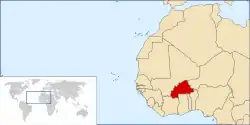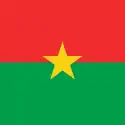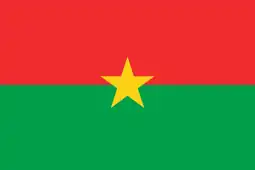Republic of Upper Volta République de Haute-Volta (French) | |||||||||
|---|---|---|---|---|---|---|---|---|---|
| 1958–1984 | |||||||||
| Motto: "Unité – Travail – Justice" (in French) "Unity – Work – Justice" | |||||||||
| Anthem: "Hymne National Voltaïque" | |||||||||
 | |||||||||
| Capital | Ouagadougou | ||||||||
| Common languages | French (official) Mossi, Fula, Gourmanché, Bambara | ||||||||
| Religion | Sunni Islam Christianity Traditional religions | ||||||||
| Demonym(s) | Upper Voltese | ||||||||
| Government | One-party presidential republic (1960–1966) Military dictatorship (1966–1984) | ||||||||
| President | |||||||||
• 1959–1966 | Maurice Yaméogo | ||||||||
• 1966–1980 | Sangoulé Lamizana | ||||||||
• 1980–1982 | Saye Zerbo | ||||||||
• 1982–1983 | Jean-Baptiste Ouédraogo | ||||||||
• 1983–1984 | Thomas Sankara | ||||||||
| High Commissioner | |||||||||
• 1958–1959 | Max Berthet | ||||||||
• 1959–1960 | Paul Masson | ||||||||
| Prime Minister | |||||||||
• 1971–1974 | Gérard Kango Ouédraogo | ||||||||
• 1983 | Thomas Sankara | ||||||||
| Historical era | Cold War | ||||||||
| 11 December 1958 | |||||||||
| 5 August 1960 | |||||||||
| 3 January 1966 | |||||||||
| 25 November 1980 | |||||||||
| 7 November 1982 | |||||||||
| 4 August 1983 | |||||||||
• Renamed | 4 August 1984 | ||||||||
| Currency | CFA franc | ||||||||
| |||||||||
| Today part of | Burkina Faso | ||||||||
| History of Burkina Faso | ||||||||||||||||||
|---|---|---|---|---|---|---|---|---|---|---|---|---|---|---|---|---|---|---|
 | ||||||||||||||||||
|
||||||||||||||||||
|
||||||||||||||||||
The Republic of Upper Volta (French: République de Haute-Volta) was a landlocked West African country established on 11 December 1958 as a self-governing state within the French Community.[1][2] Before becoming autonomous, it had been part of the French Union as the French Upper Volta. On 5 August 1960, it gained full independence from France.[3] On 4 August 1984, it changed its name to Burkina Faso.
Etymology

The name Upper Volta indicated that the country contains the upper part of the Volta River.
History
Upper Volta obtained independence on 5 August 1960, with Maurice Yaméogo of the Voltaic Democratic Union-African Democratic Rally (UDV-RDA) becoming the country's first president. A constitution was ratified the same year, establishing presidential elections by direct universal suffrage and a National Assembly with five-year terms. Shortly after coming to power, Yaméogo banned all political parties other than the UDV-RDA. He had shown a deep authoritarian streak even before then, however; between the time he became prime minister of Upper Volta while it was still a French colony and independence two years later, opposition parties were subjected to increased harassment.
On 3 January 1966, Yaméogo was overthrown in a coup d'état led by army chief of staff Sangoulé Lamizana. Although multiparty democracy was nominally restored four years later, Lamizana dominated the country's politics until he was himself overthrown in 1980.
After a series of short-term presidencies, Thomas Sankara then came to power through a military coup d'état on 4 August 1983.[4] After the coup, he formed the National Council for the Revolution (CNR), with himself as president. Under the direction of Sankara, the country changed its name on 4 August 1984, from Upper Volta to Burkina Faso, which means "Land of Incorruptible People".[5]
Politics
From 1958 to 1960, the Republic of Upper Volta was led by a high commissioner:
- Max Berthet (11 December 1958 to February 1959),
- Paul Masson (February 1959 to 5 August 1960).
From 1971 to 1987, the Republic of Upper Volta was led by a prime minister:
- Gérard Kango Ouedraogo (13 February 1971 to 8 February 1974)
- Thomas Sankara (4 August 1983 to 14 October 1987)
Symbols
Flag
The colours of the national flag corresponded to the names of its three main tributaries: the Black Volta, the White Volta and the Red Volta.[6] The flag was identical to that of the German Empire.
National Hymn
|
In French: Fière Volta de mes aieux, Nous te ferons et plus forte, et plus belle Le travail de ton sol brûlant Que Dieu te garde en sa bonté, |
In English: Proud Volta of my ancestors, We will make you stronger and more beautiful The work of your burning ground May God keep you in his goodness, |
This anthem was replaced in 1984 by a new anthem, the Ditanyè.
See also
References
- ↑ "Burkina Faso". Afripedia. Africa.com. Archived from the original on 11 February 2017. Retrieved 9 February 2017.
{{cite web}}: CS1 maint: unfit URL (link) - ↑ "Field Listing: National Holiday". The World Factbook. CIA. Archived from the original on 22 September 2020. Retrieved 30 November 2020.
- ↑ Meredith, Martin (2013). The State of Africa. Simon & Schuster. p. 69. ISBN 9780857203885.
- ↑ "Thomas Sankara". Encyclopedia Britannica. Archived from the original on 10 October 2016. Retrieved 9 February 2017.
- ↑ "More (Language of the Mossi Tribe) Phrase Book". World Digital Library. Archived from the original on 23 November 2018. Retrieved 16 February 2013.
- ↑ "Upper Volta (Burkina Faso, 1959-1984)". Flags of the World. Archived from the original on 20 September 2020. Retrieved 30 November 2020.


